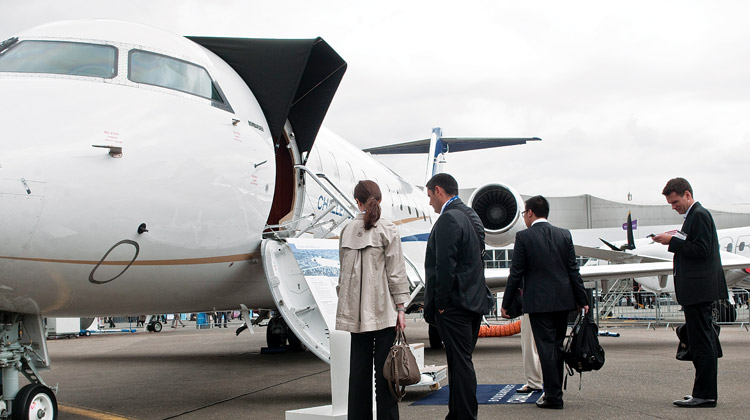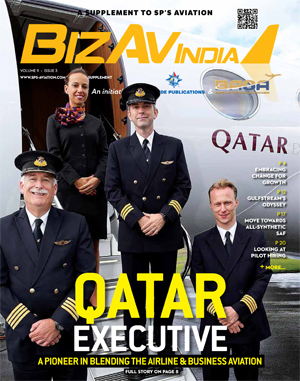How to Choose the Right Aircraft Fractional Ownership Programme
For prospective fractional owners, it is very important to carry out a thorough due diligence of the fractional operator that is offering the aircraft fractional services programme
 | By SUDHIR S. RAJESHIRKE, CHIEF OPERATING OFFICER, JETCLUB EUROPE |

Aircraft fractional ownership model is a popular business model in the western countries to access business aircraft (BA) services. The model allows BA users to access cost effective flying service as they purchase a small share in the aircraft, pay for only part of the monthly expenses and enjoy pay as you fly service.
So far, India’s taxation and the regulatory frameworks do not allow for such models to be implemented in India.
On October 10, 2022, keeping up with momentum of rapid reforms in the Indian civil aviation sector, the Minister of Civil Aviation announced that he will promote the implementation of aircraft fractional model in India. Although a lot of follow up work needs to be done by the Ministries of Finance and Civil Aviation before aircraft fractional model is officially approved, the announcement has excited the business aviation industry in India as a new opportunity for growth. Further, prospective fractional customers who were holding off their purchase and use of business aircraft see this as an opportunity to have seamless access to business aircraft at a fraction of cost and without the hassles of operating it.
However, aircraft fractional ownership is a very difficult to execute business model. The reason is that to make the fractional model attractive to customers, there are several value propositions that need to be offered that could impact the profitability of the aviation company if not done correctly. That is the reason only a handful of business aviation companies worldwide offer such product.
For prospective fractional owners, it is very important to carry out a thorough due diligence of the fractional operator that is offering the aircraft fractional services programme. Selecting the wrong fractional operator could potentially jeopardize their investment in the fractional share or could impact the quality of service that is a hallmark of such programmes.
THE FRACTIONAL OWNERS ARE ABLE TO PREDICT THEIR LIFE-CYCLE COST OF THE AIRCRAFT OVER THE DURATION OF THEIR FRACTIONAL AGREEMENT IF THEY HAVE A BUYBACK GUARANTEE
Hence this article provides guidance on how to select an aircraft fractional programme that will meet the long-term business aircraft usage requirements of a fractional owner.
Prospective fractional customers expect consistency in services and the ability to reasonably predict the cost of flying through a fractional programme over the duration of the contract. Hence they should thoroughly study the benefits of the fractional programme from various perspectives before arriving at a decision. Standard fractional owner benefits offered globally are as follows:
- Buy a share, get access to a fleet or an alternative aircraft: The biggest advantage of a fractional programme is that owners get to access a fleet of aircraft of the same type by just purchasing a share in one aircraft. This may not be the case in India as no operator operates a fleet of same type of aircraft, but ask the operator for some creative options just in case the aircraft they have a fractional share in is not available when demanded.
- Share buyback guarantee: Fractional contracts are typically of 4-5 years in duration. At the end of the contract, fractional owners have the option to exit the programme. But what about the value of their share? Well, the fractional company should be able to provide a buyback guarantee at a certain fixed price at the beginning of the contract. This protects the fractional owners from the downside residual value risk of their share. Further, the fractional owners are also able to predict their life-cycle cost of the aircraft over the duration of their fractional agreement if they have a buyback guarantee.
- Pay a fixed ‘all-inclusive’ hourly rate: Another predictable cost should be an all-inclusive hourly rate for the fractional owner. Typically, for charter flights, customers pay an hourly charter rate which varies according to the demand. In addition, the charter customers have to pay for ground handling, overnight stay for the pilots and several other unforeseen costs. In a fractional programme, the owners pay an hourly rate with no addition of overnight crew stays or parking charges etc. This is simply a pay as you go model.
- Ground handling expenses are mostly included in the hourly rate: In most cases, the ground handling is included in the hourly costs. There could be exceptions where certain high-cost airports are charged additional, which is okay as long as it is in the contract.
- Pay for only occupied hours, no positioning charges: This is a game changer in a fractional model as compared to the typical charter model. Charter customers face high flying costs as they are charged with positioning or empty leg costs. This means that if an aircraft comes to pick you up from another city, then you pay for the flying charges.
In a fractional model, the owners only pay for the ‘occupied’ time, i.e. the time they fly in the aircraft. This is equal to the block time of the flight. - Fixed monthly fee with predictable escalation over the duration of the contract: Typical aircraft fractional agreements are four to five years in duration. Providing predictable costs are a huge advantage to fractional owners. Hence, they should ensure that the fixed monthly fee should have annual escalation clauses which helps owners forecast their costs over the life-cycle of the contract.
- Guaranteed availability on same or similar aircraft within callout period: If you are a fractional owner in an aircraft, then you should have some guaranteed availability on your aircraft or similar aircraft in the fractional operator fleet within a call out of up to 72 hours. Small operators having just one to two aircraft can offer similar benefit by flying customer in a third-party aircraft of same or higher category under the same terms and conditions of the fractional contract. That is, they pay the same hourly rate for an alternate aircraft, even if it’s is larger cabin.

There are a few additional propositions that may seem attractive at first, but could potentially impact their net cost of flying and their ownership experience. Hence it is important to carry out due diligence for the following:
- Revenue sharing: Some fractional operators may offer revenue sharing to fractional owners when the aircraft is not flying for owners. While this may seem attractive at first, remember that fractional operators are able to provide the above seven benefits to fractional owners because they charter the aircraft in the open market and make up for lost revenue when servicing their fractional owners. Fractional is a tough business and it is difficult to generate margins. To provide the true benefits of fractional ownership to you, the operator has to be efficient with strong operational capabilities and has to earn additional revenue through charters.
Hence it is very rare for fractional services operators provide revenue share to the owners. In case a fractional company provides revenue share, ask whether any of the above benefits are going away. Further, do ask for detail calculations of the revenue share. Finally, calculate the tax impact of this revenue share. - Small fractions up to 1/16th share: This is attractive to some owners looking at very low acquisition and monthly cost. However, if you own 1/16th share in an aircraft then understand that there are 15 other co-owners on the same aircraft who will have same travel schedules such as yours. Hence in case of such small share, the likelihood that you will be able to fly in the aircraft that you own are very low.
THE SUCCESS OF AIRCRAFT FRACTIONAL OWNERSHIP BUSINESS DEPENDS ON THE QUALITY OF THE MANAGEMENT AND FLIGHT OPERATIONS TEAM OF THE FRACTIONAL OPERATOR
The team: Lastly, the success of aircraft fractional ownership business depends on the quality of the management and flight operations team of the fractional operator. If the management team has no experience in successful execution of the fractional programme, then the owners may face gaps in the experience that they typically expect from such a long commitment programme. Hence prospective fractional owners should find out if the fractional company has any team member who has experience in running a fractional business. Having just the knowledge of how fractional programmes work may not be sufficient for the success of your business.
Aircraft fractional ownership will be a new business model in India. There will be some pioneers in this market. The challenge is that it is a complicated programme to execute for the fractional services operator. But that’s also a good thing because it simplifies the life of a fractional owner as they can now use an aircraft at a fraction of a price with consistent service standards.
Therefore, before you select an aircraft fractional services model in which an owner has to stay committed for a duration of four to five years to the operator, then make sure that you receive a detailed financial analysis of your programme over the life cycle of the programme duration.
A new era in business aviation will come to India when such incredible business model is introduced in India. Hence I expect that the future business aviation growth will come from such high quality programmes that will help companies carry out business in remote locations that are accessible by small airports and thus increase productivity of executives and entrepreneurs.





